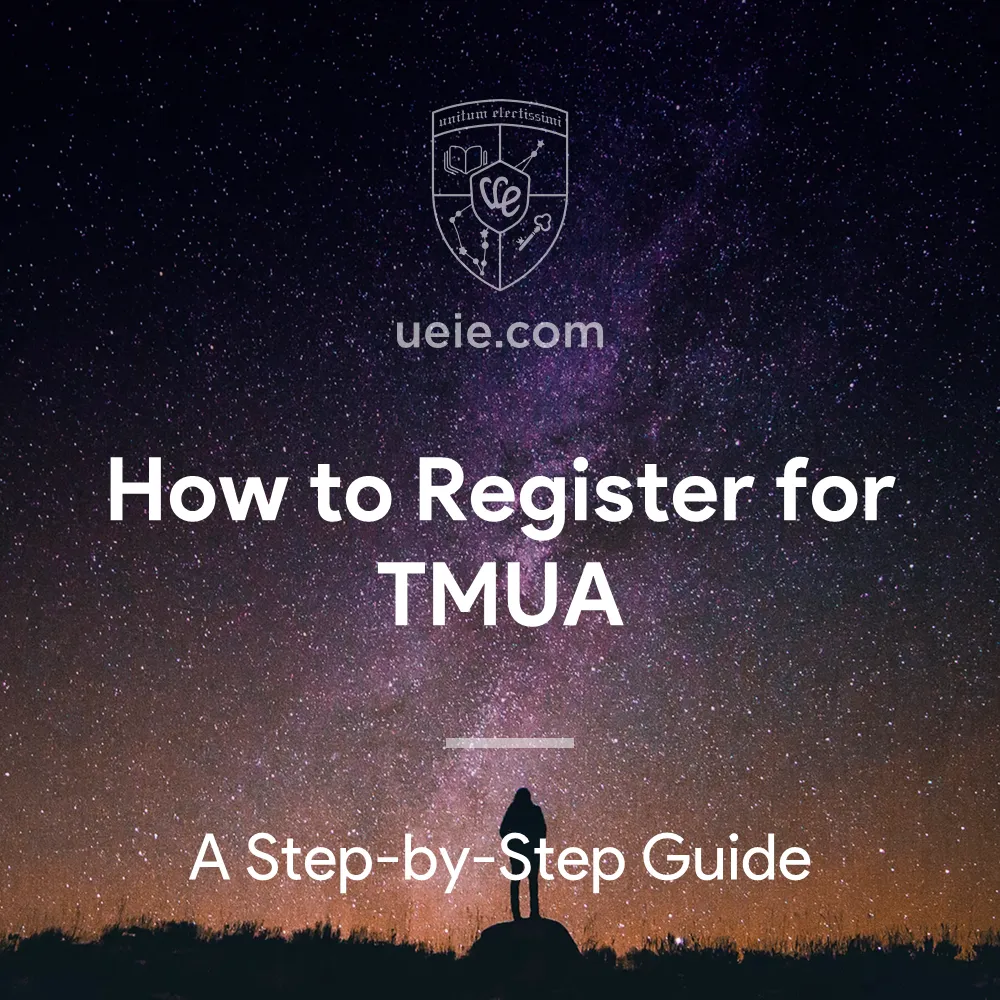TMUA Decoded: Mastering the Speed-Focused Maths Admissions Test

Independent Teacher
TMUA Decoded: Mastering the Speed-Focused Maths Admissions Test

The Test of Mathematics for University Admission (TMUA) is increasingly utilised by leading UK universities as a key means of evaluating applicants’ mathematical aptitude and potential. To help you get fully up to speed with the latest requirements and test details for the 2026 entry application cycle, I’ve drawn on my years of experience coaching for Oxbridge admissions tests to write this TMUA Comprehensive Guide. This guide provides a systematic overview of the latest TMUA developments, university requirements, key dates, test format, scoring criteria, syllabus content, and essential preparation resources, offering you a comprehensive and authoritative reference.
Once you have a general understanding of the TMUA, we recommend reading follow-up UEIE articles: TMUA Registration Guide and TMUA Preparation Guide, for more detailed instructions on registration and preparation strategies.
I. What is the TMUA Mathematics Test?
TMUA stands for the Test of Mathematics for University Admission. Its primary purpose is to assess an applicant’s ability to apply mathematical knowledge to solve problems, as well as their potential for mathematical reasoning. Several top UK universities – including the University of Cambridge, Imperial College London, the London School of Economics and Political Science (LSE), and University College London (UCL) – use the TMUA to help select applicants for undergraduate courses in Mathematics, Computer Science, Economics, and related disciplines.
II. Latest Updates on the 2025 TMUA Test
The TMUA test has undergone significant adjustments in recent years. Keeping abreast of these latest developments is crucial for both preparation and registration.
1. Unified Management Body UAT-UK
Since 2024, TMUA has been managed centrally by UAT-UK, a non-profit organisation jointly established by the University of Cambridge and Imperial College London. It now forms part of their assessment framework alongside the Engineering and Science Admissions Test (ESAT) and the Thinking Assessment for Arts and Humanities (TARA, introduced in 2025).
2. Test Format and Delivery Partner
TMUA is administered as an online, computer-based test. It is delivered by the global assessment provider Pearson VUE through its worldwide network of certified test centres.
3. Specific Date Arrangements and Restrictions
Since 2024, TMUA typically offers testing windows in October and the following January.
- Testing Window Choice: Candidates applying for 2026 entry to relevant courses at the University of Cambridge must take the test in October 2025; the January 2026 session is not an option for them.
- Specific Date Restriction: Candidates applying to the University of Cambridge from Mainland China, Hong Kong, or Macau are not permitted to take the TMUA test on 13 October 2025. Consequently, applicants from these regions targeting relevant Cambridge courses can only sit the TMUA on 14 October 2025.
- Verification is Essential: Please be aware that the specific dates and times available for booking may differ between test centres. Always consult the Pearson VUE registration system and official UAT-UK announcements for the most accurate and up-to-date information.
4. Increasingly Specific University Requirements
As the UAT-UK assessment system has become established, TMUA’s significance as an admissions tool for certain leading universities and specific degree programmes (particularly in Mathematics, Computer Science, and Economics) has grown. Several programmes now mandate or strongly recommend the TMUA (further details are provided in the next section).
III. Who Needs to Take the TMUA Test? (For 2026 Entry)
Specific TMUA requirements vary between UK universities and degree programmes. These requirements can change annually and can be quite detailed (e.g., specifying whether the test is compulsory, recommended, or simply an alternative option). Therefore, all candidates are strongly advised to treat the official websites of their chosen universities as the ultimate authority for the latest admissions information specific to 2026 entry.
1. G5 University Courses Requiring TMUA Scores
The table below lists G5 university courses known to require TMUA scores, provided for reference.
| University | Courses | Approximate Score Reference* | Alternative Test / Notes |
|---|---|---|---|
| University of Cambridge | Computer Science (G400) | 7.5+ | Usually no alternative |
| Economics (L100) | 7.0+ | Usually no alternative | |
| Imperial College London | Mathematics Dept. Programmes (G100, G103, etc.) | 6.5+ | STEP might be considered in exceptional circumstances, e.g., post-deadline (check website for latest info) |
| Economics, Finance and Data Science (L1N3) | 6.5+ | ||
| London School of Economics (LSE) | Economics (L101) | 7.0+ | |
| Econometrics and Mathematical Economics (L142) | 7.0+ | ||
| Mathematics and Economics (GL11) | 7.0+ | ||
| University College London (UCL) | Economics (L100) | 6.5+ | UCL’s test requirements are complex; check website. Some economics-related programmes may move to TARA |
*Approximate Score Reference: This is based on unofficial data from previous admission cycles and does not represent a minimum required score.
2. TMUA Requirements at Other Universities
- University of Warwick: Requires applicants for Mathematics, Statistics, Computer Science, and Economics-related courses to submit TMUA scores. However, for Mathematics and Statistics courses, STEP or AEA scores may be accepted as alternatives.
- Durham University, University of Bath, and others: In the past, some Mathematics, Economics, and Computer Science related courses at these and other universities have also required TMUA scores.
Requirements regarding the TMUA test for specific courses at different universities can change. Once you have decided which universities and courses you are applying to, it is recommended that you consult the official university websites to understand the latest and most accurate entry requirements.
IV. TMUA Test Key Dates
Below is a summary of the key dates for the Autumn 2025 and Early 2026 testing sessions. Please note that the registration periods shown are provisional; you should closely monitor official announcements for confirmed dates.
1. Autumn 2025 (1st Sitting) Schedule
| Key Stage | Date |
|---|---|
| Registration Period | 31 Jul – 29 Sep 2025 |
| Test Dates | 13–14 October 2025 |
| Results Release | 14 Nov 2025* |
Key Restrictions:
- Candidates applying for Economics and Computer Science at the University of Cambridge must take the test during this session.
- Candidates applying to the University of Cambridge from Mainland China, Hong Kong, or Macau are not permitted to sit the test on 13 October 2025 and must therefore take it on 14 October 2025.
2. Early 2026 (2nd Sitting) Schedule
| Key Stage | Date |
|---|---|
| Registration Period | 27 Oct – 19 Dec 2025 |
| Test Dates | 8–9 January 2026 |
| Results Release | Approx. 6 weeks after test* |
Key Restrictions:
- This session is not available for candidates applying to the University of Cambridge.
*UAT-UK will notify candidates by email when their results are available to view in their UAT-UK account. Candidates will also receive a document explaining how to interpret their results.
V. TMUA Test Format and Structure
The table below summarises the key elements of the TMUA test format.
| Item | Details |
|---|---|
| Format | Online Computer-based Test, taken at a Pearson VUE test centre. |
| Paper Structure | Two Papers:
|
| Question Type | Multiple Choice Questions |
| Number of Questions | 20 questions per paper, total 40 multiple-choice questions. |
| Duration | 75 minutes per paper, total 150 minutes. |
| Timing | Each paper is timed separately. Time unused in Paper 1 cannot be carried over to Paper 2. |
| Calculator | Calculators are not permitted. |
| Formula Sheet | Formula sheets are not permitted. |
VI. TMUA Scoring Mechanism and Result Interpretation
1. Scoring Mechanism and Score Conversion
- Raw Score: Each multiple-choice question is worth 1 mark. Incorrect answers or unanswered questions score 0 marks. The maximum raw score for each paper is 20, making the total maximum raw score for the test 40.
- Score Conversion: To ensure comparability of results across different test sittings, raw scores are converted to a standardised scale ranging from 1.0 to 9.0, usually reported to one decimal place. Universities primarily use this 9.0-scale standardised score for assessment purposes.
- Important Change in Results Report: From 2024 onwards, the official TMUA results report provided by UAT-UK only includes the overall converted score, no longer providing separate converted scores for Paper 1 and Paper 2. A more detailed official explanation of the results report can be downloaded from the UAT-UK website.
2. Result Interpretation: Competitiveness Analysis by Score Band
There is no official Pass Mark for TMUA. Whether a score is competitive depends entirely on the university and course you are applying to, as well as the overall standard of applicants in that year. Based on the official UAT-UK explanation of the 2024/25 TMUA results and my own experience with students, here is an interpretation of some representative scores:
- 4.5 is the average score: This suggests that most students achieve scores around 4.5. From observing numerous students, the majority who attain an A* in A-Level Mathematics can reach this level without systematic preparation. A score of 4.5 can be broadly considered equivalent to an A* standard in A-Level Maths.
- Around 7.0 places you in the top 10%: Based on application cases from students I coached last year, those achieving this score typically received interview invitations from Cambridge and had a high success rate in securing offers from other G5 universities like Imperial and LSE.
- Only about 5% of candidates score 8.0 or above: Candidates scoring in the 8.0-9.0 range are undoubtedly highly competitive. Although Cambridge’s final decision also considers interview performance and other application materials, such scores significantly increase the chances of receiving offers from top institutions like Imperial, LSE, and UCL.
VII. TMUA Syllabus and Difficulty Analysis
Understanding what TMUA assesses and where its difficulties lie is fundamental to devising an effective preparation plan.
1. Syllabus Overview for TMUA Test
Although the organising body for TMUA test changed in 2024, the overall syllabus has seen little change, especially for Paper 2, where the syllabus remained untouched.
Paper 1: Applications of Mathematical Knowledge
- Assessment Objective: To assess the candidate’s ability to apply mathematical knowledge flexibly to solve problems.
- Knowledge Scope: Primarily based on AS Level Mathematics content, including Algebra and Functions, Coordinate Geometry, Sequences and Series, Trigonometry, Exponentials and Logarithms, Calculus, and Graphing Functions. It also covers some GCSE Mathematics content, such as Number and Units, Ratio and Proportion, Basic Algebra, Geometry, Statistics, and Probability.
Paper 2: Mathematical Reasoning
- Assessment Objective: To assess the candidate’s ability in mathematical reasoning and logical thinking.
- Knowledge Scope: Builds upon the mathematical knowledge required for Paper 1.
- Emphasis: Focuses on understanding the logic of arguments, mathematical proof (including identifying common errors in proofs), and higher-level logical reasoning problems.
Accessing the Official Latest Syllabus
Please ensure you consult the latest version of the TMUA syllabus document published on the UAT-UK official website.
2. Difficulty Characteristics Analysis
The difficulty of TMUA differs from tests like STEP. It doesn’t lie in the intrinsic complexity or abstruseness of the problems, but rather in the following aspects:
- Extreme Time Pressure: The average time of 3.75 minutes per multiple-choice question is the core challenge of TMUA test. This demands not only solid knowledge but also exceptional problem-solving efficiency and speed.
- Breadth of Knowledge and Fluency: The test covers a wide range, requiring candidates to be extremely fluent with fundamental concepts, able to recall and apply them quickly and accurately. The prohibition of calculators places higher demands on mental arithmetic and written calculation skills.
- Mathematical Reasoning Requirements: The logical thinking, proof comprehension, and error identification skills tested in Paper 2 require dedicated training to adapt and improve accuracy.
- Multiple-Choice Format: Although multiple-choice, the questions and options are often cleverly designed, incorporating traps and distractors, necessitating careful reading, precise calculation, and effective elimination. There are no marks for working, yet the demand for accuracy is extremely high.
In short, TMUA primarily assesses a student’s fluent application of mathematical knowledge and the agility and accuracy of their mathematical reasoning under strict time constraints. Its difficulty stems more from the demands for ‘speed’ and ‘accuracy’ rather than ‘depth’ and ‘complexity’.
VIII. How to Register for the TMUA Test?
Since 2024, the registration process for the TMUA test has changed compared to the past, primarily conducted through the officially designated online platform.
1. Main Pathway
Candidates need to register via the website of Pearson VUE, the official partner testing service for UAT-UK. This usually involves first creating a UAT-UK personal account and then using that account to book a test session and location.
2. Key Reminders
- Registration Deadline: Pay close attention to the official registration deadline for the test session you plan to take (refer to Section IV of this article, and confirm with the final official announcement). Complete registration and payment in advance.
- Limited Test Slots: Test slots in popular locations may be limited. It is advisable to register and book your test as early as possible once registration opens.
3. Registration Process
Detailed information regarding the steps for account creation, required information, test centre search and selection, test fees, payment methods, and applications for special arrangements (if needed) are all explained step-by-step in our dedicated guide.
Please click the following post for the most complete and accurate operational instructions.

How to Register for TMUA
IX. TMUA Test Core Preparation Strategy and Resource Recommendations
Having grasped the fundamental information about TMUA, how should one approach preparation? I will first outline the core preparation strategy, then recommend relevant resources.
1. Core Preparation Strategy for the TMUA Test
Given that TMUA primarily assesses the fluent application of mathematical knowledge, agility and accuracy in mathematical reasoning, under strict time limits (see Section VII), the preparation strategy should focus on:
- Knowledge Level: You must achieve high fluency in the required AS Mathematics and relevant GCSE content outlined in the syllabus, ensuring concepts can be recalled instantly and applied rapidly.
- Skills Level: Focus on training and improving calculation speed and precision (in a non-calculator environment), agility in logical judgement, and strategies and techniques for tackling multiple-choice questions (especially identifying distractors).
- Practice Level: Extensive, targeted timed practice is essential to adapt to the exam pace and translate knowledge and skills into stable performance under pressure.
The above represent the core directions for TMUA preparation. For detailed strategies and steps on systematically planning preparation, implementing phased learning, using specific training methods (like error analysis, time management techniques), and enhancing specific abilities, please be sure to read my dedicated post TMUA Preparation Guide.
TMUA Preparation Guide:

Conquer the TMUA: Speed & Accuracy Training for Top Maths Scores
2. Official Core Resources
You can obtain the most authoritative information from the UAT-UK official website, including:
- The latest version of the TMUA syllabus
- Official specimen papers and practice materials
- Examination guidance and FAQs
- Past papers (2016-2024)
3. UEIE TMUA Courses and Materials
To enhance the efficiency and effectiveness of TMUA preparation, I (Mr. Xie Tao) have developed a comprehensive set of TMUA preparation materials based on years of admissions test teaching experience. This set includes detailed video lectures, accompanying PDF textbooks, online practice question banks, and full-length mock exams. I revise and update these materials annually to ensure they align with the latest exam trends and requirements.
TMUA & MAT On-Demand Prep Suite
Additionally, I collaborate with several international schools to offer TMUA preparation classes. Interested students and parents can find details about related courses and materials via the following link.
TMUA & MAT Live Classes
4. Other Supplementary Resources
- Relevant Mathematics Resource Websites: Websites like MEI (Mathematics Education Innovation) offer practice questions and resources related to AS/GCSE Mathematics.
- Problem-Solving Books: Some books focus on enhancing mathematical thinking, problem-solving speed, and accuracy.
- Online Communities and Forums: Platforms like The Student Room (TSR) may offer shared experiences, but please evaluate information critically.
5. Resource Usage Suggestions
- Prioritise Official Materials: Use the UAT-UK official syllabus and specimen/past papers as the core.
- Be Targeted: Select supplementary resources based on your preparation stage and weak areas.
- Select Efficiently: Quality over quantity; avoid information overload.
- Engage Actively: Actively think, deeply review, and summarise when using any resource.
X. Next Steps Recommended
After reading this Comprehensive Guide to TMUA, you should have a clear grasp of the key information regarding this test. To translate this understanding into effective application preparation, we recommend you take the following actions immediately:
1. Verify Official Requirements
Immediately visit the official admissions websites of your target universities and courses. Carefully confirm their latest and most accurate entry requirements for 2026 entry, especially regarding specific regulations for TMUA (or other admissions tests), score references, and alternative options.
2. Plan Exam Registration
Read the TMUA Registration Guide in detail to fully understand the registration process, required materials, deadlines, and test centre selection. Remember the registration deadlines and ensure you complete registration and booking within the specified timeframe.
3. Develop a Preparation Plan
Study the TMUA Preparation Guide thoroughly. Combining the difficulty analysis from Section VII and the preparation strategy from Section IX of this article, create a detailed and feasible preparation plan tailored to your situation. Start preparation early, especially for those needing significant improvement in speed and fluency.
4. Select Preparation Resources Carefully
Download and study the latest TMUA syllabus and official specimen/past papers from the UAT-UK website. Based on your preparation plan, selectively use high-quality supplementary resources, such as the preparation courses and materials offered on the UEIE TMUA preparation page, for systematic learning and targeted training.

TMUA Prep Hub
Finally, thorough preparation and a positive attitude are key to tackling the TMUA challenge. Wishing you success in your preparation and application, ultimately securing an offer from your desired university!
Follow Us on Wechat



